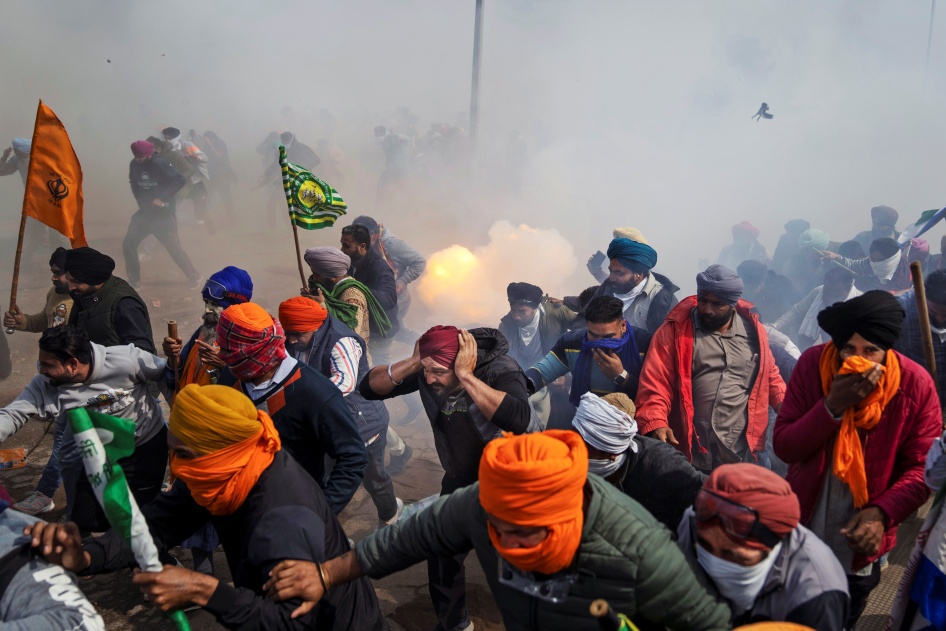(New York) – Indian authorities are using threats, excessive force, and internet shutdowns to stop farmers from holding peaceful protests, Human Rights Watch said today. Since mid-February 2024, farmers from Punjab and Haryana states seeking higher prices for their produce have congregated outside India’s capital, New Delhi, to raise their demands.
The protests revive a year-long movement that ended in 2021 after tens of thousands of farmers camped outside New Delhi and obtained the repeal of new agricultural laws. The farmers’ current demands include an expanded list of 23 crops that the government would purchase at a minimum guaranteed price. To prevent the demonstrators from entering the city, the authorities have barricaded highways with cement blocks, metal containers, and barbed wire. Talks between the farmers and the government have been deadlocked.
“The Indian authorities have an obligation to uphold the right to peaceful protest, whoever is taking part and whatever the issue,” said Elaine Pearson, Asia director at Human Rights Watch. “The authorities may not threaten or use force against the farmers to deny their right to express their views in a peaceful manner.”
India’s Bharatiya Janata Party (BJP)-led government has repeatedly cracked down on peaceful protests and arrested critics of government policies. In response to the farmers’ protest, the government has urged dialogue. However, the authorities have threatened to revoke demonstrators’ passports and visas, with a police official stating, “We have identified them with CCTV and drone cameras. We will request the ministry of home affairs and the embassy to cancel their visas and passports.”
The authorities also deployed drones and used tear gas shells to disperse gatherings and medical camps. They fired shotguns loaded with metal pellets, which can cause blindness and other serious injury, for crowd control. On February 21, Shubhkaran Singh, a 24-year old farmer, died of a bullet wound to the head after police repeatedly fired on protesting farmers in the area bordering Punjab and Haryana states.
The protesting farmers have taken several measures to counter security force actions, such as flying kites to distract drones, wearing swimming goggles to protect their eyes from tear gas, and using their tractors to pull down barricades.
The Haryana government imposed temporary restrictions on internet services in seven districts in an apparent attempt to disrupt the farmers’ protests, a tactic the Indian government often uses for political purposes. The Global Government Affairs team at X (formerly Twitter) stated that the Indian government issued “executive orders” requiring them to take down specific accounts on February 21. Most of these accounts, including some barred on Facebook, belong to journalists reporting on the protests, farmers union leaders, and others supporting the farmers’ actions.
India is obligated under international human rights law to ensure that internet-based restrictions are provided by law and are a necessary and proportionate response to a specific security concern. In July 2016, the United Nations Human Rights Council condemned measures to intentionally prevent or disrupt access to or dissemination of information online.
BJP supporters have used social media to describe the protesting farmers, many from the Sikh minority community, as “separatists,” a dangerous accusation. In West Bengal state, a BJP leader used a similar slur against a Sikh police officer, leading to strong condemnation by police officers and protests by the Sikh community. The authorities have repeatedly failed to hold to account BJP leaders and supporters who incite violence against religious minority communities, which communal divisions can escalate to a human rights crisis, Human Rights Watch said.
The Indian government should publicly direct the security forces to abide by the UN Basic Principles on the Use of Force and Firearms by Law Enforcement Officials and take all other necessary steps to ensure that the forces act with restraint, Human Rights Watch said. Protest organizers should take steps to deter their supporters from engaging in violence against members of the public and law enforcement officers.
The 2020 UN guidance on “less-lethal weapons” in law enforcement says, “Multiple projectiles fired at the same time are inaccurate and, in general, their use cannot comply with the principles of necessity and proportionality. Metal pellets, such as those fired from shotguns, should never be used.”
“As India heads into elections, it’s critical for the BJP-led government to act to minimize rather than exacerbate political violence,” Pearson said. “A genuine commitment to human rights and democracy means providing room for dissent, peaceful protest, and political disagreement.”









